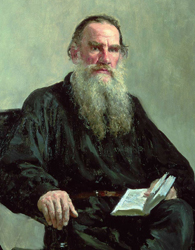Leo Tolstoy proclaimed, “The sole meaning of life is to serve humanity.” His rebellion toward society, and his philosophical and idealistic outlook fashioned his paradoxical and inquisitive nature. His romantic prose, attitude for nonviolence, and dedication to ideals influenced many political and spiritual leaders. As professor Andy Kaufman points out, “he was more than a great writer, he was a phenomenon.”
Leo Tolstoy’s Early Days
Count Lev Nikolayevich Tolstoy was born on September 9, 1828, on his aristocratic family’s estate in Yasnaya Polyana, Russia. His mother died before he was two years old, causing him grief and sorrow that would plague him the rest of this life. He and his four siblings moved to Moscow’s Tula region, and shortly thereafter his father, Count Nikolay Ilyich Tolstoy, was murdered—most likely by his own servants. A few months later, his grandmother and primary caretaker passed away, forcing Leo and his siblings to live with extended relatives.
He was ushered off to Kazan University at age 16, where he studied languages and law, but he grew bored and dropped out to join the Russian army and fight at Sebastopol, an experience that became his muse for writing.
Sources in this Story
- Encyclopedia Britannica: Leo Tolstoy
- Time: Books: Leo Tolstoy
- Democracy Now: Leo Tolstoy’s War and Peace: A Look at the Epic Russian Novel and its Author
- Russian Life: Leo Tolstoy
- The Guardian: The Death of Ivan Ilyich and other stories by Leo Tolstoy
- NPR: Love and Hate: A Tolstoy Family Tale
- Linguadex: The Last Days of Leo Tolstoy
Tolstoy’s Novels
At age 30 he returned from his travels around Europe, where he explored different teaching methods after starting a peasant day school for the children in Yasnaya Polyana, his family’s estate. He compiled books on teaching, landing him his first note of acclaim.
He wrote more than 15 books; his first three novels, “Childhood,” “Boyhood” and “Youth” were autobiographical accounts of his orphan life. As a Russian Count, Tolstoy merged his political influence and contributions to Russian culture, which can be seen in motifs throughout his later fictional works.
In 1865, Tolstoy wrote the epic novel “War and Peace,” in which he introduced 559 characters—a record amount of characters to be written into a book. In the story, Tolstoy intertwines individual narratives to illustrate the impact of Napoleon’s invasion, and examines the philosophical and moral implications of tsarist Russia and the French Revolution. Tolstoy’s “constant state of reflection is seen in this book,” and Andy Kauffman, a lecturer at the University of Virginia, declares that it put him “on par with Homer, Shakespeare, Goethe.”
Tolstoy’s next great work, “Anna Karenina,” was a tragic love affair set during a time when women’s matrimonial principles shifted from economic stability to romantic love. With questions of a woman’s true social role, Anna finds her heart divided between her duties as a wife and mother, and her longing for intense passion. According to Russian Life, “Tolstoy is pessimistic about the meaning of life.”
Around the age of 45, the concept of death pulled Tolstoy into a deep depression and his quest for answers to existential questions led him to anguish. “Confessions” is an anthology of his inner turmoil dealing with religion, and his short story, “The Death of Ivan Ilyich” is an exploration of Tolstoy’s quest for the meaning of life.
The Man and His Work
The Rest of the Story
NPR parallels the introductory line of Anna Karenina—“All happy families are alike; each unhappy family is unhappy in its own way”—to Tolstoy’s life. His marriage to aristocrat and artist, Sonya Andreyevna Bers, started out passionately, but inevitably became inundated with the prevalent “love-hate” theme. Her willingness to raise their 13 children and work on his manuscripts didn’t negate the fact that they didn’t agree on religious or social views.
Tolstoy’s life was defined by a quest for moral perfection, the pursuit of living simply, and adherence to a personal manifesto. He once wrote, “I would be the unhappiest of men if I could not find a purpose for my life.” During his life, many important figures (such as Nobel Prize Winner Jane Addams) looked to Tolstoy for inspiration, but he could only provide them with words of wisdom; he simultaneously grappled with increasing depression, which left him in a state of despair. Leo Tolstoy died on November 20, 1910.
This article was originally written by Jen O’Neill; it was updated September 2, 2017.











